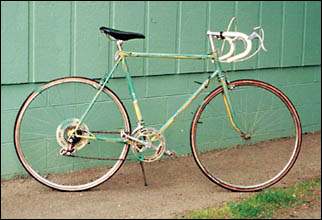Fighting Gridlock With Ugly Bikes
A ragtag fleet of bicycles is solving some environmental problems for the small city of Roseburg, Oregon. Handy racks of these colorful bikes dot the public landscape, and their use is free to everyone. People borrow the bikes and when they’re through, they return them to the closest bike stand. The "ugly" bikes provide a healthy alternative to car transportation, and they help create bike awareness in the city.

Roseburg’s bikes may be ugly, but they provide free and reliable transportation that gets cars off local roads.
Deanna Mather Larson
Roseburg’s Community Transportation Resource Committee came up with the idea. It acquired a small grant and invited the public to donate used bicycles and parts. Then the committee asked Clint Hampton, a juvenile service specialist at the Pitchford Boys Ranch, for help in getting the bikes into shape. "We have up to 18 boys at a time," says Hampton. "They’re real excited and want to work on the bikes."
The fleet includes mountain bikes, three- and ten-speeds, and even single speeds with coaster brakes. Every bike gets a safety overhaul. Some are outfitted with baskets. Then they’re painted—orange, green, silver, many with streaks or spots—at the whim of the painter. The result is functional bikes that are so ugly very few are stolen.
"Most people riding these bikes actually use them to get back and forth to work," says Jim Watson, a member of the Community Transportation Resource Committee. "An older lady uses one with a basket to get a small amount of groceries."
And the project is expanding. "We’re hoping to put anywhere from 30 to 50 more bikes out," says Hampton. He also plans an additional element to the program. As with library books, people will be able to take a bike home for a few weeks or months and then return it.
The program uses very little money. A local business provided a professional paint job for a few of the newer bikes, and as funds are needed, these spiffy bikes are raffled off to raise money for the ugly ones. The proceeds buy tubes and cables. "Stuff you really can’t take off other bikes," says Hampton.
No formal study proves that this project is making an environmental difference, but people are using the ugly bikes, and that means fewer cars on the streets. Bikes and parts donated to the project don’t end up in the landfill. And bike usage encourages a bike-friendly environment that’s good for any city.

